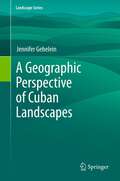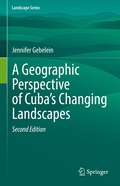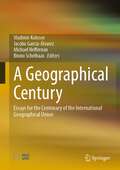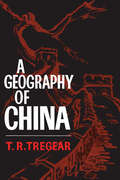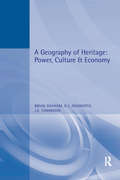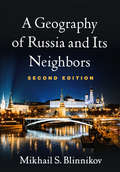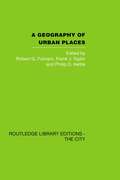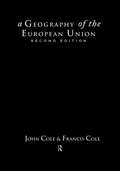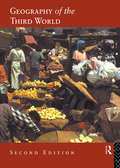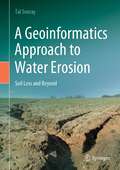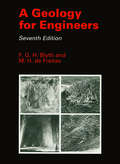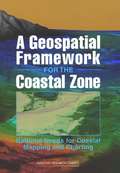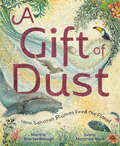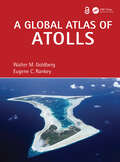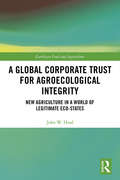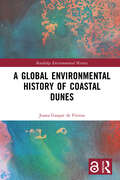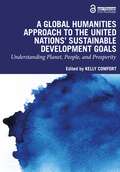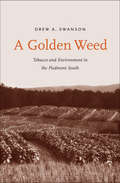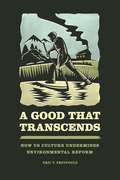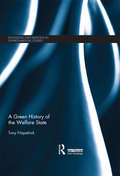- Table View
- List View
A Geographic Perspective of Cuban Landscapes (Landscape Series #15)
by Jennifer GebeleinBeginning in the era of the Spanish conquest and taking the reader right up to the present day, this book focuses on how the landscape of Cuba has changed and evolved into the environment we see today. It illustrates the range of factors - economic, political and cultural - that have determined Cuba's physical geography, and explores the shifting conservation measures which have been instituted in response to new methods in agriculture and land management. The text uses historical documents, fieldwork, Geographic Information System (GIS) data and remotely-sensed satellite imagery to detail Cuba's extensive land-use history as well as its potential future. The author goes further to analyze the manner, speed and methods of landscape change, and examines the historical context and governing agendas that have had an impact on the relationship between Cuba's inhabitants and their island. Gebelein also assesses the key role played by agricultural production in the framework of international trade required to sustain Cuba's people and its economy. The book concludes with a review of current efforts by Cuban and other research scientists, as well as private investors, conservation managers and university professors who are involved in shaping Cuba's evolving landscape and managing it during the country's possible transition to a more politically diverse, enfranchised and open polity.
A Geographic Perspective of Cuba’s Changing Landscapes (Landscape Series #33)
by Jennifer GebeleinThis book is based on research that gives the reader a nonfiction view of how Cuba’s landscape has changed since the time when Columbus first set foot on the island and encountered the Indigenous peoples who lived there in 1492 to present day.An analysis of landscape change over time is presented and that transformation from a heavily forested island to less than (currently) 18% forest cover is described. The government has established a system of protected areas and strong governmental controls over environmental policies and the manner with which the island can be built upon by foreign investors, urban expansion projects, or natural resource exploitation.Current GIS and remote sensing research of Cuba’s atmosphere, physical landscape and aquatic features is provided to underscore the complex environmental structures that epitomize Cuba. The author discusses past, present and future impact factors including history, technological assessments, laws and policies, relationships with other countries and education.
A Geographical Century: Essays for the Centenary of the International Geographical Union
by Michael Heffernan Bruno Schelhaas Jacobo García-Álvarez Vladimir KolosovThis volume of specially commissioned interpretative essays marks the centenary of the establishment of the International Geographical Union in 1922. Written by leading human and physical geographers from all parts of the world, A Geographical Century considers the history and present condition of geography as an international science. Based on the latest research, A Geographical Century provides new and critical analyses of the different forms of geographical internationalism that emerged during the 20th century; the changing relations between geography and cognate disciplines in the natural and social sciences; the geopolitics of international geographical collaboration; and the prospects of geography as a 21st century international science.
A Geographical Guide to the Real and the Good
by Robert SackFirst published in 2003. Routledge is an imprint of Taylor & Francis, an informa company.
A Geography of China
by T.R. TregearThis book is intended primarily for serious students of geography but it will also appeal to the general reader. For this reason technical terms have been used as sparingly as is consistent with correct meaning. Wherever the subject matter permits, the author emphasizes geographical growth and shows the interaction of geographical environment and the human activity and institutions. When originally published in the 1960s China was beginning to change with breathtaking rapidity. These changes are presented here against geographical and historical background. Knowledge of the environmental facts is essential to an appreciation of the political, economic, and social problems that have faced the Chinese people.
A Geography of Heritage: Power, Culture And Economy (A\hodder Arnold Publication)
by Brian Graham Greg Ashworth John TunbridgeThe concept of heritage relates to the ways in which contemporary society uses the past as a social, political or economic resource. However, heritage is open to interpretation and its value may be perceived from differing perspectives - often reflecting divisions in society. Moreover, the schism between the cultural and economic uses of heritage also gives rise to potential conflicts of interest. Examining these issues in depth, this book is the first sustained attempt to integrate the study of heritage into contemporary human geography. It is structured around three themes: the diversity of use and consumption of heritage as a multi-sold cultural and economic resource; the conflicts and tensions arising from this multiplicity of uses, producers and consumers; and the relationship between heritage and identity at a variety of scales.
A Geography of Russia and Its Neighbors, Second Edition
by Mikhail S. BlinnikovAuthoritative yet accessible, the definitive undergraduate text on Russian geography and culture has now been thoroughly revised with the latest data and hot topics, such as the political crisis in Ukraine and the annexation of Crimea and Sevastopol. Thematic chapters provide up-to-date coverage of Russia's physical, political, cultural, and economic geography. Regional chapters focus on the country's major regions and the other 14 former Soviet republics. Written in a lucid, conversational style by a Russian-born international expert, the concise chapters interweave vivid descriptions of urban and rural landscapes, examinations of Soviet and post-Soviet life, deep knowledge of environmental and conservation issues, geopolitical insights, engaging anecdotes, and rigorous empirical data. Over 200 original maps, photographs, and other figures are also available as PowerPoint slides at the companion website, many in color. New to This Edition *Separate chapter on Ukraine and Crimea. *Timely topics--the political crisis in Ukraine and annexation of Crimea and Sevastopol; the return of Putin as president; climate change and environmental degradation; economic slowdown; political shifts in the republics; the role of Russian-backed forces in Syria, Libya, and Central African Republic; changes in Russia–United States relations; and more. *Thoroughly updated population, economic, and political data. *80 new or updated figures, tables, and maps. Pedagogical Features *End-of-chapter review questions, suggested assignments, and in-class exercises. *Within-chapter vignettes about Russian places, culture, and history. *End-of-chapter Internet resources and suggestions for further reading. *Companion website with all figures and maps from the book, many in full color.
A Geography of Urban Places (Routledge Library Editions)
by Robert G. Putnam Frank J. Taylor Philip G. KettleThis book presents a selection of readings to present varied opinions, approaches and reports from various international professional journals. Among the journals represented are: Regional Science Association Journal, The Canadian Geographer, The Annals of the American Association of Geographers, Economic Geography, Landscape, Journal of Soil and Water Conservation and Land Economics. This book was first published in 1970.
A Geography of the European Union
by John ColeCan the European Union continue to grow and also converge? Is uniformity within the union desirable? The European Union has grown into a supranational entity formed from a mosaic of diverse regions. Its enlargement to encompass a number of Central European countries seems only a matter of time. With the EU's political and economic importance growing globally, the Union's influence is increasingly being felt within its Member States. A new geography is emerging with pressures to reduce regional disparities by a process of convergence. A Geography of the European Union provides a comprehensive introduction to the European Union, its identity, problems and prospects. Focusing on the key issues of integration and enlargement, the authors examine the major economic, social, environmental and political aspects of the EU, both in terms of its individual regions and as a system of interdependent states that form the single EU entity. Assessment of controversial issues is frank: problems of unemployment, social stress, ageing and the place of women are covered objectively, prompting readers to form their own interpretations. This completely revised and expanded 2nd Edition includes a wealth of new illustrations, data and analysis. Setting the EU within a broader European and global context, this book provides a comprehensive introduction to the changing geography of the European Union and its place in a rapidly changing world.
A Geography of the Third World
by C. G Clarke Dr J Dickenson J. P Dickenson W.T.S Gould S Mather Sandra Mather Prof R Prothero R. M Prothero D. J Siddle C. T Smith Mr C Smith E. Thomas-HopeThe label of "Third World" covers half the land surface and three quarters of the population of the planet. The problems and potential of this region and its peoples are attracting increasing concern and interest.Fully revised and updated this edition includes: * a wealth of photographic and line illustrations* boxed case studies* chapter summaries* guides to further readingIssues of increasing concern at the end of the twentieth century are fully addressed - for example, the widening gap in economic performance between countries in the Third world and the assertion of national cultures in the face of globalisation. New material on gender issues and the environmental impact of development has been included.
A Geoinformatics Approach to Water Erosion: Soil Loss and Beyond
by Tal SvorayDegradation of agricultural catchments due to water erosion is a major environmental threat at the global scale, with long-lasting destructive consequences valued at tens of billions of dollars per annum. Eroded soils lead to reduced crop yields and deprived agroecosystem’s functioning through, for example, decreased water holding capacity, poor aeration, scarce microbial activity, and loose soil structure. This can result in reduced carbon sequestration, limited nutrient cycling, contamination of water bodies due to eutrophication, low protection from floods and poor attention restoration—consequences that go far beyond the commonly modelled soil loss and deposition budgets. This book demonstrates, using data from the Harod catchment in northern Israel, how cutting-edge geoinformatics, data science methodologies and soil health indicators can be used to measure, predict, and regulate these major environmental hazards. It shows how these approaches are used to quantify—in time and space—the effect of water erosion not only on the soil layer, soil minerals, and soil loss, but also on the wide-range of services that agricultural ecosystems might supply for the benefit and well-being of humans. The algorithms described in this book play a major role in this paradigm shift and they include, for example, extraction of photogrammetric DEMs from drone's data, advanced drainage structure calculations, fuzzy process-based modelling and spatial topographic threshold computations, multicriteria analyses and expert-based systems development using analytic hierarchal processes, innovative data-mining and machine learning tools, autocorrelation and interpolation of soil health, physically-based soil evolution models, spatial decision support systems and many more.
A Geology for Engineers
by F.G.H. Blyth Michael De FreitasNo engineering structure can be built on the ground or within it without the influence of geology being experienced by the engineer. Yet geology is an ancillary subject to students of engineering and it is therefore essential that their training is supported by a concise, reliable and usable text on geology and its relationship to engineering. In this book all the fundamental aspects of geology are described and explained, but within the limits thought suitable for engineers. It describes the structure of the earth and the operation of its internal processes, together with the geological processes that shape the earth and produce its rocks and soils. It also details the commonly occurring types of rock and soil, and many types of geological structure and geological maps. Care has been taken to focus on the relationship between geology and geomechanics, so emphasis has been placed on the geological processes that bear directly upon the composition, structure and mechanics of soil and rocks, and on the movement of groundwater. The descriptions of geological processes and their products are used as the basis for explaining why it is important to investigate the ground, and to show how the investigations may be conducted at ground level and underground. Specific instruction is provided on the relationship between geology and many common activities undertaken when engineering in rock and soil.
A Geometrical Approach to Physics
by David A. Burton Adam NobleThis book provides an accessible introduction to using the tools of differential geometry to tackle a wide range of topics in physics, with the concepts developed through numerous examples to help the reader become familiar with the techniques.Physical applications are used to develop the techniques and demonstrate their wide-ranging applicability. Formalism is introduced sparingly and step-by-step, where it is needed, and chapters contain exercises for readers to test their understanding. Worked solutions to the exercises are included.It is an ideal textbook for advanced undergraduate or postgraduate courses on mathematical methods for physicists, for students whose background is in physics rather than mathematics. It is assumed that the reader has no prior knowledge of mathematical methods beyond the content of a standard undergraduate physics degree.The purpose of the book is to act as a ‘gateway’ to more advanced books on the applications of differential geometry in physics. It will also help the reader to better appreciate modern physics research that makes use of differential geometry, and the common features that permeate the discipline as a whole.Key Features: Presents a light and accessible treatment. Can be used as a textbook for a short course on mathematical methods for physicists. Accessible to advanced undergraduates and postgraduates whose background is in physics, not mathematics. David A. Burton received his PhD from Lancaster University, UK, in 2000 and was appointed Lecturer in Physics there in 2005. He is currently Senior Lecturer in Physics at Lancaster. He began his research career in relativistic continuum mechanics and gravitational physics before turning to fluid-structure interactions (in particular, vortex-induced vibration) and, in later years, to relativistic laser-plasma interactions.Adam Noble received his PhD in 2006, also from Lancaster University, and has since held postdoctoral positions at Lancaster and the University of Strathclyde, Scotland, where he is currently a Research Fellow. His interests lie at the interface of physics with geometry, in particular electrodynamics of intense fields, plasma physics and particle physics.The authors maintain a long-standing collaboration and, over the years, have worked on a number of topics connecting electromagnetics, gravitation and plasma physics, including gravitational Sagnac interferometry, relativistic wave-breaking in plasmas, radiation reaction in relativistic plasmas and charged particle beams, and the use of laser-wakefield accelerators in searches for light, weakly-interacting, candidates for dark matter.
A Geospatial Framework for the Coastal Zone: National Needs for Coastal Mapping and Charting
by National Research Council of the National AcademiesThe coastal zone is of enormous importance to the well-being of the nation, as our lives and economy are inextricably linked to the features and activities that occur within this dynamic region. In order to understand and address the effects of natural and anthropogenic forces in the coastal zone, a holistic multidisciplinary framework is required to account for the interconnectivity of processes within the system. The foundation of this framework is accurate geospatial information—information that is depicted on maps and charts. A Geospatial Framework for the Coastal Zone National Needs identifies and suggests mechanisms for addressing national needs for spatial information in the coastal zone. It identifies high priority needs, evaluates the potential for meeting those needs based on the current level of effort, and suggests steps to increase collaboration and ensure that the nation’s need for spatial information in the coastal zone is met in an efficient and timely manner.
A Gift of Dust: How Saharan Plumes Feed the Planet
by Martha BrockenbroughFrom two award-winning creators comes a picture book that reveals the hidden wonders of how Saharan Dust impacts the world: from slowing a hurricane to nourishing a rainforest.This dust . . .of what lived oncesustains what lives today and what will be born . . .tomorrow.An ancient catfish becomes a fossil, and as the lake where it lived dries up, the fossil turns to dust--but this isn't ordinary dust. This dust begins in Chad, West Africa, but winds carry it across the continent, over the Atlantic ocean, to nourish and replenish the Amazon rain forest and beyond. A Gift of Dust takes readers on a journey that shows just how interconnected our planet is, and how something so small can have such a huge impact. With lyrical, awe-inspiring verse based in fact, and stunning art from a Caldecott honoree, this is a story for our times.
A Global Atlas of Atolls
by Walter M. Goldberg Eugene C. RankeyScattered like dots rising from the deep across vast expanses of the world’s tropical and subtropical oceans, atolls with their turquoise lagoons and reefs teeming with colorful marine life have captured the public imagination. They have also been the homeland of millions of people for millennia as various groups of migrants spread across the far reaches if the Pacific, Indian and Western Atlantic regions. Developed from recently available satellite data, A Global Atlas of Atolls presents high-quality details of 476 atolls across the globe, characterizing aspects of the atoll rim, the lagoon, and their coral reef communities in unprecedented detail. In synthesizing and enhancing understanding of these unique seascapes, this volume provides a distinct compendium of descriptions and images, as well as documentation of the environmental conditions of winds, waves, and tides and a summary of the background literature for each atoll area. There is no comparable work.After an introduction that includes a glossary of terms, each atoll is documented in the form of an atlas written for scientists, but accessible to any diver or reader interested in these spectacular reef-island habitats. This book also describes some current challenges and perspectives on their future. It will be useful as a reference work for marine scientists, while providing a minimum of technical jargon for those who are not scientists, but who enjoy reading about exotic places with unusual attributes.Chapter 3 of this book is freely available as a downloadable Open Access PDF at http://www.taylorfrancis.com under a Creative Commons [Attribution-Non Commercial-No Derivatives (CC-BY-NC-ND)] 4.0 license.
A Global Corporate Trust for Agroecological Integrity: New Agriculture in a World of Legitimate Eco-states (Earthscan Food and Agriculture)
by John W. HeadThis book examines global environmental governance and how legal, institutional, and conceptual reform can facilitate a transformation to a new ‘natural-systems’ form of agriculture. Profound global climate disruption makes it essential that we replace our current agricultural system – described in this book as a fossil-carbon-dependent ‘modern extractive agriculture’ – with a natural-systems agriculture featuring perennial grains growing in polycultures, thereby mimicking the natural grassland and forest ecosystems that modern extractive agriculture has largely destroyed. After examining relevant international legal and conceptual foundations (sovereignty, federalism, global governance) and existing international organizations focusing on agriculture, the book explores legal and institutional opportunities to facilitate dramatic agricultural reform and ecological restoration. Among other things, it explains how innovative federalism structures around the world provide patterns for reorienting global environmental governance, including what the book calls eco-states that would, through exercise of pluralistic sovereignty, be responsible for agroecological management. Drawing from his experience working in international institutions, the author provides detailed global-governance proposals for facilitating the type of agricultural reform that can help avoid ecological collapse, especially through soil degradation and climate change. This book will be of great interest to students and scholars of international law, agroecology, climate change, ecological restoration, sustainable development, and global governance, as well as policy-makers and practitioners working in these fields.
A Global Environmental History of Coastal Dunes (Routledge Environmental History)
by Joana Gaspar de FreitasThis book provides a holistic perspective on coastal dunes, highlighting new insights into present-day challenges to show that narratives, along with numbers, graphics, and computer models, have a role to play in climate change science, policymaking, and citizenship awareness.Adopting a cross-disciplinary approach, this book combines fiction, history, and science, to discuss past, present, and future ways of living in coastal areas. Dunes are hybrid environments, a combination of natural elements and human agency; they tell stories of values, traditional wisdom, institutions, empires, technology, vulnerabilities, coastal management, adaptation, andsustainability. Drawing on the past, Joana Gaspar de Freitas unpacks a diverse and fascinating history of dunes, linking knowledge, methods, and approaches from several case studies across the world, including France, Portugal, Brazil, Mozambique, New Zealand, USA, and the UK. The book connects the bio geophysics of global change with the main driver of transformation— human agency—to integrate and address nature-society issues, taking human and nonhuman agents into account. In following the choices, paths, and strategies that created today’s coastal landscapes, the book generates greater awareness and understanding of how to shape coastal futures.This is an engaging, original, and, fundamentally, important book that fills a gap in our knowledge of cities, infrastructure, economies, and cultures built on shorelines. A key read for scholars, researchers, and students in environmental history, environmental science, sustainability, coastal land management, and climate change.
A Global Environmental Right (Routledge Explorations in Environmental Studies)
by Stephen TurnerThe development of an international substantive environmental right on a global level has long been a contested issue. To a limited extent environmental rights have developed in a fragmented way through different legal regimes. This book examines the potential for the development of a global environmental right that would create legal duties for all types of decision-makers and provide the bedrock for a new system of international environmental governance. Taking a problem solving approach, the book seeks to demonstrate how straightforward and logical changes to the existing global legal architecture would address some of the fundamental root causes of environmental degradation. It puts forward a draft global environmental right that would integrate duties for both state and non-state actors within reformed systems of environmental governance and a rational framework for business and industry to adhere to in order that those systems could be made operational. It also examines the failures of the existing international climate change regime and explains how the draft global environmental right could remedy existing deficits. This innovative and interdisciplinary book will be of great interest to policy-makers, students and researchers in international environmental law, climate change, environmental politics and global environmental governance as well as those studying the WTO, international trade law, human rights law, constitutional law and corporate law.
A Global Humanities Approach to the United Nations' Sustainable Development Goals: Understanding Planet, People, and Prosperity
by Kelly ComfortThis edited textbook explores the 17 UN SDGs through 12 works from the humanities, including films, novels, and photographic collections. It provides students with the knowledge and understanding of how the humanities engage in broader social, political, economic, and environmental dialogue, offering a global perspective that crosses national and continental borders. The book takes students through the UN SDGs from a theoretical perspective through to practical applications, first through specific global humanities examples and then through students’ own final projects and reflections. Centered around three major themes of planet, people, and prosperity, the textbook encourages students to explore and apply the Goals using a place-based, culturally rooted approach while simultaneously acknowledging and understanding their global importance. The text’s examples range from documentary and feature film to photography and literature, including Wang Jiuliang’s Plastic China, Kip Andersen and Keegan Kuhn’s Cowspiracy: The Sustainability Secret, Barbara Dombrowski’s Tropic Ice: Dialog Between Places Affected by Climate Change, and Aravind Adiga’s The White Tiger, among others. Providing diverse geographic and cultural perspectives, the works take readers to Argentina, Australia, China, Costa Rica, Ecuador, France, Greenland, Haiti, India, Japan, Peru, Rwanda, Senegal, and the United States. This broad textbook can be used by students and instructors at undergraduate and postgraduate levels from any subject background, particularly, but not exclusively, those in the humanities. With added discussion questions, research assignments, writing prompts, and creative project ideas, students will gain a nuanced understanding of the interconnectivity between social, cultural, ethical, political, economic, and environmental factors.
A Global Warming Primer: Answering Your Questions About The Science, The Consequences, And The Solutions
by Jeffrey BennettIs human-induced global warming a real threat to our future? Most people will express an opinion on this question, but relatively few can back their opinions with solid evidence. Many times we've even heard pundits say "I am not a scientist" to avoid the issue altogether. But the truth is, the basic science is not that difficult. Using a question and answer format, this book will help readers achieve three major goals: To see that anyone can understand the basic science of global warming; To understand the arguments about this issue made by skeptics, so that readers will be able to decide for themselves what to believe; To understand why, despite the "gloom and doom" that often surrounds this topic, the solutions are ones that will not only protect the world for our children and grandchildren, but that will actually lead us to a stronger economy with energy that is cheaper, cleaner, and more abundant than the energy we use today.
A Golden Weed
by Dr Drew A. SwansonDrew A. Swanson has written an "environmental" history about a crop of great historical and economic significance: American tobacco. A preferred agricultural product for much of the South, the tobacco plant would ultimately degrade the land that nurtured it, but as the author provocatively argues, the choice of crop initially made perfect agrarian as well as financial sense for southern planters. Swanson, who brings to his narrative the experience of having grown up on a working Virginia tobacco farm, explores how one attempt at agricultural permanence went seriously awry. He weaves together social, agricultural, and cultural history of the Piedmont region and illustrates how ideas about race and landscape management became entangled under slavery and afterward. Challenging long-held perceptions, this innovative study examines not only the material relationships that connected crop, land, and people but also the justifications that encouraged tobacco farming in the region.
A Good That Transcends: How US Culture Undermines Environmental Reform
by Eric T. FreyfogleSince the birth of the modern environmental movement in the 1970s, the United States has witnessed dramatic shifts in social equality, ecological viewpoints, and environmental policy. With these changes has also come an increased popular resistance to environmental reform, but, as Eric T. Freyfogle reveals in this book, that resistance has far deeper roots. Calling upon key environmental voices from the past and present—including Aldo Leopold, Wendell Berry, David Orr, and even Pope Francis in his Encyclical—and exploring core concepts like wilderness and the tragedy of the commons, A Good That Transcends not only unearths the causes of our embedded culture of resistance, but also offers a path forward to true, lasting environmental initiatives. A lawyer by training, with expertise in property rights, Freyfogle uses his legal knowledge to demonstrate that bad land use practices are rooted in the way in which we see the natural world, value it, and understand our place within it. While social and economic factors are important components of our current predicament, it is our culture, he shows, that is driving the reform crisis—and in the face of accelerating environmental change, a change in culture is vital. Drawing upon a diverse array of disciplines from history and philosophy to the life sciences, economics, and literature, Freyfogle seeks better ways for humans to live in nature, helping us to rethink our relationship with the land and craft a new conservation ethic. By confronting our ongoing resistance to reform as well as pointing the way toward a common good, A Good That Transcends enables us to see how we might rise above institutional and cultural challenges, look at environmental problems, appreciate their severity, and both support and participate in reform.
A Green History of the Welfare State (Routledge Explorations in Environmental Studies)
by Tony FitzpatrickEnvironmental problems – particularly climate change – have become increasingly important to governments and social researchers in recent decades. Debates about their implications for social policies and welfare reforms are now moving towards centre stage. What has been missing from such debates is an account of the history of the welfare state in relation to environmental issues and green ideas. A Green History of the Welfare State fills this gap. How have the environmental and social policy agendas developed? To what extent have welfare systems been informed by the principles of environmental ethics and politics? How effective has the welfare state been at addressing environmental problems? How might the history of social policies be reimagined? With its lively, chronological narrative, this book provides answers to these questions. Through overviews of key periods, politicians and reforms the book weaves together a range of subjects into a new kind of historical tapestry, including: social policy, economics, party politics, government action and legislation, and environmental issues. This book will be a valuable resource for students and scholars of environmental policy and history, social and public policy, social history, sociology and politics.
A Green Vitruvius: Principles and Practice of Sustainable Architectural Design
by Vivienne Brophy J Owen Lewis2000 years ago the roman architect Marcus Vitruvius Pollio wrote the ten books on architecture establishing the concept of the pattern book offering design principles and solutions that is still referred to in every architect's education. A Green Vitruvius is intended as a green pattern book for today. Now fully updated, this well established textbook provides advice suitable for undergraduate and post graduate students on the integration of sustainable practice into the design and construction process, the issues to be considered, the strategies to be adopted, the elements of green design and design evaluation within the process. Classic design elegance is found in the holistic clear solution.
